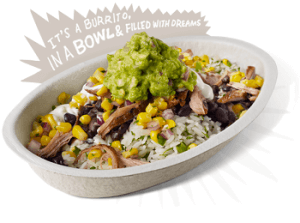
“Be regular and orderly in your life, so that you may be violent and original in your work.”
Gustave Flaubert
I’m sure you’ve heard about the power of routine — or even the importance of routine — by now. Perhaps you read about Kurt Vonnegut’s daily routine, which involved rising early and daily trips to the local swimming pool. Or Hemingway, who wrote standing up, and always first thing in the morning.
Not to put myself on the same level as the greats, but I’ve developed a very idiosyncratic routine myself. One that settles me into the day and allows me to work on a variety of creative projects at a time. It’s also a routine that many people find hard to comprehend. Because it’s so repetitive.
And delicious.
In short: My name is Yoni, and I eat two Chipotle bowls a day. I go every day at lunchtime and order two to go. I eat one when I get home and warm one up later for (my first) dinner.
When I tell people this, I usually get a lot of questions, ranging from from “Isn’t that unhealthy?” to “Don’t you eat anywhere else?” My favorite, though, is: “Are you crazy?”
Good question. Am I?
Probably. But crazy is relative. I eat Chipotle twice a day because it’s delicious, it’s fast, it’s filling, and it’s relatively healthy and inexpensive. More importantly, I’m working on so many projects I enjoy right now — projects that are challenging and ambiguous and time-intensive — that I need some structure in my daily life. Not having to worry about deciding the majority of my meals, while still enjoying them and knowing what I’m going to expect, means that I can spend my energy in other, more productive ways.
So yes, you might think I’m crazy for eating the same thing twice a day, every day.
But, as someone who eats 4-5 meals a day, I think it’s crazy how much time and effort would potentially be spent if I had to worry about preparing most of those meals or trying out a new place every day. “Lunch” might seem like a minor decision, but if you’re unfamiliar with the place, one simple choice is actually comprised of several more demanding ones.
First you research and wonder if the Yelp reviews are really real. Then you decide, order, wait, pick up, and either stay there or head home. If you don’t like your order, or you find yourself asking, “Why am I still hungry 45 minutes after eating that $15 deconstructed organic beet and kale salad?” then there’s even more work to do.
I also cook — breakfast (eggs) and second dinner (fish) — and I do go out and meet friends for (a third) dinner a few days a week. I’m talking here about my core working hours, when the time and effort I would use to decide what to order or make could be going into new product design for my business, writing new content, or practicing the drums and working on a video.
The real reason I eat Chipotle so frequently, though, is that the process and the act have become the cornerstone of my new career as a creative entrepreneur. My borderline addiction is less about sustenance than it is about the importance of routine.
Although I definitely recommend the burrito bowl diet, I don’t think your Two Bowls A Day needs to necessarily be about food. I’m not just talking about lunch or dinner. I’m talking about how you anchor your routine around something by eliminating unnecessary choices to consume and shift mental and physical energy toward the projects that truly deserve them.
Defining the importance of routine
So why are routines so important?
There are many obvious reasons for having a routine. Routines give you power over your day. Routines provide stability and channel your energy. Routines maintain forward motion and allow you to build on something every day, as opposed to constantly starting over.
But when defining the importance of routine, I think it’s actually more interesting to ask the question in reverse. What happens when you don’t have a routine?
Until a couple years ago, I worked as a management consultant, a job that required constant travel and crazy schedules. I did my best, but could never stick to one workout plan without a consistent gym or predictable times and days to work out. My diet was irregular and often extremely unhealthy. I didn’t sleep well, and I got sick often. On every creative thing I started — another blog I used to write, for example — I didn’t follow through.
There were other reasons for my lack of productivity and discipline back then, but not having a consistent routine was the root cause. Without it, I didn’t really feel like I was in control of my life. I loved the travel aspect of that job, and I wouldn’t trade those experiences for anything, but I was always at the whim of my company.
Not my own.
Finding your daily routine
 We’re all working on different things, in different places, at different times. My current situation is fairly unique in that I work primarily from home and, though I interact with people all day by phone and email, spend a lot of time alone. I don’t mind that at all — in fact, coming from a job where every single project was team-based and client-facing, I rather enjoy it.
We’re all working on different things, in different places, at different times. My current situation is fairly unique in that I work primarily from home and, though I interact with people all day by phone and email, spend a lot of time alone. I don’t mind that at all — in fact, coming from a job where every single project was team-based and client-facing, I rather enjoy it.
And every day brings a new challenge. Starting and running your own business means constantly learning, thinking, and acting. Product design, copywriting, marketing, sales, business development — I love it all, but it also takes a great deal of creative, mental, and physical energy. I can’t afford to be slowed down, if I can help it.
At the most fundamental level, food is fuel. Caramelized, sautéed, glazed, or reduced, it’s all — my apologies for being reductive here — going to the same place. I enjoy great meals and the social value of sharing meals with people, of course, but in my Chipotle routine —
I’ve found what works for me.
Which I think is the most important part of a routine. Realizing that everyone is different and operates differently, and that what is most efficient and enjoyable for one person might not be the most ideal for another. That’s the beauty of routine: It’s a general strategy that is highly personal.
Which is why I love reading about the daily routines and habits of successful people, from artists to executives. They are wildly different from one another but similar in one essential way — they work. And they work specifically for the person who developed them, for reasons most likely inapplicable to me or you.
Routine as structure, life as improvisation
 A few days ago, while practicing jazz drumming, I thought of a metaphor.
A few days ago, while practicing jazz drumming, I thought of a metaphor.
The first thing you learn as a jazz drummer is the importance of keeping time. Specifically, the tah, tah, tuh-tah, tah, tuh-tah pattern on the ride cymbal and the strong “chick” of the hi-hat on beats two and four. As you progress, you learn to incorporate improvisational patterns with the bass drum and snare drum, feeding off the other musicians you play with.
The ride and the hi-hat are life’s routine — the structure over which we can then improvise.
Without the backbeat, the consistent layer, everything seems to fall apart. When the rhythm section is keeping time, the horns can wail and improvise and the pianist can jam away. (Purists will mention that structure is far less defined within sub-genres in jazz, but this is one of those “learn the rules before you break them” things.) To develop a solid foundation, you start with just that — a foundation. Then build on the foundation. A strong foundation is malleable and adaptive.
Routines are our foundation.
Chipotle is my two and four. My foundation. The pillar of my routine.
So tell me: What are your two Chipotle bowls?
(And Chipotle — if you’re reading this — please contact me regarding Yoni Dina: The Guacumentary when you have a chance.)


